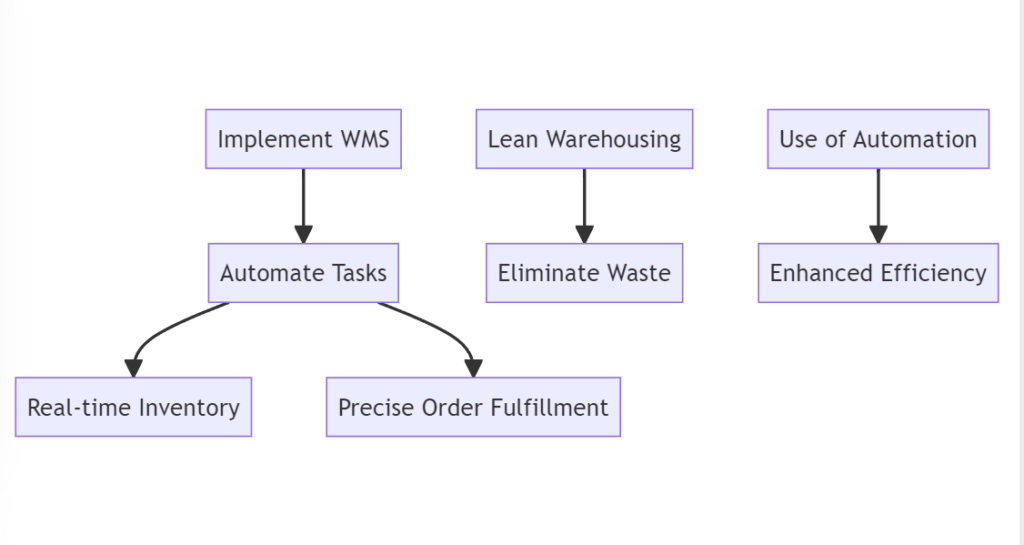
Over the past few years, the world of e-commerce has evolved, and so too have customer expectations. Consequently, this has brought about a revolution in warehousing and inventory management. This article aims to elucidate every aspect of modern warehousing, offering insights and strategies for businesses of all sizes to ensure efficient logistics and inventory management.
A Deep Dive into the Concept of Warehousing
Warehousing is the linchpin in the supply chain that keeps e-commerce businesses afloat. It involves the storage of goods and merchandise while awaiting transportation to retail outlets or directly to customers. Modern warehouses, however, do more than just store products; they have become critical centers for order fulfillment, product bundling, and even returns processing.
The Evolution of Warehousing: Past, Present, and Future
Historically, warehouses were merely storage facilities. Today, they’re dynamic hubs of activity that can significantly impact an e-commerce business’s success. This transformation is largely due to advancements in technology, increased customer demands, and the need for businesses to stay competitive in a fast-paced industry.
Why Warehousing is Essential for Your Business
Effective warehousing strategies can dramatically improve an e-commerce business’s operations by enhancing inventory management, streamlining order fulfillment, and improving customer satisfaction.

Enhanced Inventory Management
Efficient warehousing ensures optimal inventory management. It enables businesses to have a real-time understanding of their inventory levels, reducing the risk of overstocking or understocking.
Streamlined Order Fulfillment
A well-structured warehouse increases the speed and accuracy of order fulfillment. An effective warehousing strategy ensures that products are quickly located, packaged, and shipped to customers, thereby enhancing the overall customer experience.
Improved Customer Satisfaction
By ensuring fast and accurate order fulfillment, warehousing plays a significant role in meeting and exceeding customer expectations. Satisfied customers lead to repeat business and positive word-of-mouth, integral components for business growth.
Optimizing Warehouse Operations: Key Strategies
To fully reap the benefits of warehousing, e-commerce businesses need to embrace several key strategies to optimize warehouse operations.
Implement a Warehouse Management System (WMS)
A WMS is a software application designed to support warehouse operations. This can drastically improve warehouse efficiency by automating various tasks, providing real-time inventory visibility, and ensuring precise order fulfillment.
Lean Warehousing
Lean warehousing aims to eliminate waste in the form of time, effort, and space. By implementing lean principles such as ‘5S’ (Sort, Set in order, Shine, Standardize, Sustain), businesses can significantly improve their warehousing efficiency.
Use of Automation and Robotics
The use of automation and robotics in warehousing is rapidly growing. Automated storage and retrieval systems (ASRS), robotic picking systems, and automated guided vehicles (AGVs) can considerably enhance warehouse efficiency and accuracy.

The Role of Third-Party Logistics (3PL) Providers
3PL providers are external companies hired to handle logistics operations, including warehousing and order fulfillment. Collaborating with a 3PL provider can be a strategic move for businesses that want to focus more on their core competencies, while leaving logistics to the experts.
The Vital Role of Warehouses in E-commerce Operations
In the fast-paced world of e-commerce, warehouses play a vital role in ensuring seamless and efficient operations. They serve as the backbone of online businesses, acting as strategic hubs that facilitate the storage, organization, and distribution of goods. Let’s explore how warehouses fit into e-commerce operations and contribute to the success of online businesses.

Centralized Storage and Inventory Management
One of the primary functions of warehouses in e-commerce is to provide centralized storage for a wide range of products. Warehouses serve as secure locations where businesses can store their inventory until it is ready to be shipped to customers. This centralized storage allows for better organization and inventory management, ensuring that products are readily available and easily accessible when orders are placed.
By implementing robust inventory management systems, warehouses can track stock levels, monitor product expiration dates (in the case of perishable goods), and efficiently manage the inflow and outflow of products. This level of control over inventory enables businesses to avoid stockouts, prevent overstocking, and accurately forecast demand, ultimately leading to improved customer satisfaction.
Order Fulfillment and Shipping Efficiency
Efficient order fulfillment is a critical aspect of e-commerce operations, and warehouses play a key role in making it possible. When an order is placed, warehouses spring into action, picking, packing, and preparing the products for shipment. Skilled warehouse staff ensure that the correct items are accurately retrieved from the inventory, carefully packaged to prevent damage during transit, and labeled with the necessary shipping information.
By streamlining the order fulfillment process within warehouses, businesses can achieve faster turnaround times, reducing the time it takes for products to reach customers’ doorsteps. This level of efficiency is vital in meeting customer expectations for prompt delivery, enhancing their overall shopping experience, and fostering customer loyalty.
Product Quality Control and Returns Processing
Maintaining product quality is of utmost importance for any e-commerce business. Warehouses play a crucial role in ensuring that products meet the highest standards before they are shipped to customers. Warehouse staff can conduct quality control checks to inspect products for defects, damage, or any other issues that could impact customer satisfaction.
In addition, warehouses handle the complex task of returns processing. When customers initiate return requests, warehouses receive the returned items, inspect their condition, and determine whether they can be restocked or if they require further actions, such as refurbishment or disposal. Efficient returns processing within warehouses enables businesses to provide timely refunds or exchanges, building trust with customers and reinforcing their confidence in the brand.
Value-Added Services and Customization
Modern warehouses offer more than just storage and order fulfillment services. They have evolved to provide value-added services that cater to the specific needs of e-commerce businesses. These services can include product customization, bundling, kitting, labeling, or even gift wrapping.
By leveraging these value-added services, warehouses help businesses differentiate themselves in the competitive e-commerce landscape. Customized packaging or personalized messages can create memorable unboxing experiences for customers, fostering brand loyalty and positive word-of-mouth recommendations.
Scalability and Flexibility
Warehouses provide e-commerce businesses with the scalability and flexibility necessary to adapt to changing market dynamics. As online businesses grow, they require additional space to accommodate expanding inventories. Warehouses offer the ability to scale up or down based on seasonal demand, market trends, or business fluctuations, allowing businesses to optimize costs and efficiently manage their operations.
Moreover, warehouses enable businesses to explore new market opportunities by providing a strategic presence in different geographic regions. By establishing multiple warehouses in strategic locations, businesses can reduce shipping costs, shorten delivery times, and better serve customers in various regions, ultimately enhancing their competitive advantage.
The Power of Efficient Warehousing in E-commerce
Efficient warehousing is a cornerstone of successful e-commerce operations. By providing centralized storage, streamlining order fulfillment, ensuring product quality control, offering value-added services, and enabling scalability, warehouses contribute significantly to the success of online businesses.
Investing in advanced warehouse management systems, embracing automation and innovative technologies, and fostering collaborative partnerships within the supply chain are key strategies to optimize warehousing operations and gain a competitive edge.
As e-commerce continues to thrive and evolve, warehouses will remain essential components of the digital shopping landscape, supporting businesses in meeting customer demands, enhancing operational efficiency, and driving sustainable growth.
Wrapping Up: The Future of Warehousing
The warehousing industry continues to evolve with technology advancements and shifting consumer demands. As businesses strive to stay competitive, the importance of efficient and flexible warehousing will only continue to grow. Therefore, it’s vital for e-commerce businesses to continually adapt and refine their warehousing strategies to meet the demands of the ever-changing e-commerce landscape.
By understanding and implementing the strategies discussed in this article, you’ll be well on your way to transforming your warehousing operations and ultimately, enhancing your business’s efficiency and profitability.